|
Executive Summary The best path to prosperity is a job. Work brings dignity, hope, and purpose to people by allowing them to earn a living, gain skills, and build social capital that endures. Unfortunately, state and local governments frequently impose regulatory obstacles that hinder this path. Arizona has been at the forefront of removing such hurdles, most recently with the enactment of House Bill 2569. Known as “universal recognition,” this streamlines occupational licensing across dozens of professions by allowing skilled professionals to use their out-of-state experience to quickly obtain a license to work in their new state. Arizona pioneered this approach to help workers relocate, and it is already working, incentivizing even more people to move to the state, and supporting long-term economic growth and job creation. States should follow Arizona’s lead and remove overly burdensome occupational regulations, with universal reforms at the heart of such efforts. Numerous governors have already signed versions of universal licensing recognition into law, and even more are poised to enact the reform in the next few years.
0 Comments
Occupational licensing hinders individuals attempting to work in their chosen field, often with little benefit to the public. Key points – Occupational licenses should only be required where there is a clear and convincing need to protect the health and safety of the public and the license is reasonably expected to achieve that protection. – Texas has taken important strides in recent years to reduce the number of unnecessary occupational licenses, but more needs to be done. – Occupational licenses should be reviewed and eliminated if determined to be unnecessary to protect the health and safety of the public. Originally posted at TPPF. In this Let People Prosper episode, we discuss how to unveil government excess whether it be with pension obligation bonds, bail (register for upcoming TPPF event), occupational licensing burdens reduced for military spouses, TRS pension structural problems, and the Texas House budget that increases far more than the average taxpayer's ability to pay.
#letpeopleprosper In this Let People Prosper episode, we may have had our best show yet. You don't want to miss our discussion on increasing local debt transparency, paths to decreasing recidivism rates, the limitations of the Success Sequence, flaws with gun laws, excess spending in the Texas budget, and much more.
#letpeopleprosper TxLege Review on Sunshine Week, Bad Occ Licensing Bills, CJ Reforms: Let People Prosper Ep 803/11/2019 In this Let People Prosper episode, James Quintero, Derek Cohen, and I go over this week's key issues in the Texas Legislature.
These include issues related to the following:
#letpeopleprosper In this Let People Prosper episode, James Quintero, Dr. Derek Cohen, and I discuss the following:
In this Current Events Friday episode of the Let People Prosper show, James Quintero, Dr. Derek Cohen, and I discuss:
Thanks for watching and be sure to subscribe. #letpeopleprosper In this Let People Prosper episode, let's discuss how the best path to prosperity is capitalism and that starts with a job. The more ways that we can free up the labor market from government barriers to opportunity, such as the minimum wage and occupational licensing, the more prosperity we can all enjoy.
My recent op-ed in the Investor's Business Daily titled "Amazon's Minimum Wage Revelation: It's About Competition, Not Workers" notes the opportunity costs associated with a government-mandated minimum wage compared with a private market decision: "Just as the company's management had the freedom to consider the firm's profitability and outlook in deciding whether to offer the higher wage, other private employers should have the same freedom. Amazon apparently thinks they shouldn't, hence the lobbying for a national mandate. Those lobbying efforts could end up doing even more harm." My recent paper with Dr. Edward Timmons titled "Occupational Licensing: Keeping People Poor" notes the huge cost that many licenses have on people whether they be workers, consumers, or employers. We highlighted this in a recent op-ed: "Between 1993 and 2012, Texas added licensing requirements for 22 low-income occupations. Data from the Texas Department of Licensing and Regulation indicate a 460 percent increase in the number of licenses issued by the department, far surpassing the state’s population growth of 37.5 percent in that period. By making it harder for aspiring workers in Texas to enter the job market, licenses artificially inflate wages — and this means higher prices for the services provided. National estimates suggest that licensing inflates wages of professionals by about 15 percent. And this means consumers pay higher prices. In addition, individuals looking to enter a new field may be prevented from achieving their dreams." For the sake of human flourishing, we should be doing all we can to reduce government barriers to prosperity that are socialist programs like the minimum wage (price of labor control) and occupational licensing (quantity of labor control). #LetPeopleProsper Commentary at McAllen Monitor.
Texas has job openings; Texas has workers willing and eager to fill them. Where’s the disconnect that has resulted in labor shortages in a number of fields? It could be occupational licensing. In many ways, the Texas model of limited government is a blueprint for D.C. and other states. The Federal Reserve Bank of Dallas’ latest reading of Texas’ economy is very positive. Personal income growth in the second quarter of 2018 was 6 percent — the highest in the nation. And the U.S. Bureau of Labor Statistics recently noted that Texas’ annualized private sector job creation rate of 3.9 percent is about double the national average of 2 percent. Yet there are labor shortages in several fields. There are not enough qualified workers to fill the jobs available. If this problem persists, the ability of Texas to sustain its economic momentum will be restrained. One qualification, which often presents an unnecessary, artificial barrier to employment and prosperity, is occupational licensing. These laws say that willing workers must get a permission slip from state bureaucrats in Austin. To obtain the permission slip, aspiring workers need to pass exams, pay fees, complete minimum levels of education and training, or meet other entry requirements. In 2015, more than 24 percent of workers in Texas had a license. That makes sense for family doctors and surgeons. But hairdressers, auctioneers and (in some states) interior designers? Not so much. We highlight the problems presented by overly burdensome occupational licensing in Texas in a new report published by the Texas Public Policy Foundation. According to the Institute for Justice’s ranking of occupational licensing for states, Texas is right around the middle of the pack — ranked 21st in the burden presented by licenses for low-income occupations. And unfortunately, Texas has mostly been moving in the wrong direction. Between 1993 and 2012, Texas added licensing requirements for 22 low-income occupations. Data from the Texas Department of Licensing and Regulation indicate a 460 percent increase in the number of licenses issued by the department, far surpassing the state’s population growth of 37.5 percent in that period. By making it harder for aspiring workers in Texas to enter the job market, licenses artificially inflate wages — and this means higher prices for the services provided. National estimates suggest that licensing inflates wages of professionals by about 15 percent. And this means consumers pay higher prices. In addition, individuals looking to enter a new field may be prevented from achieving their dreams. Proponents of these licenses claim that it protects the public’s health, safety, or welfare. But the risk of harm presented in these professions varies dramatically. Bad haircuts aren’t fatal. Neither is poor auctioneering or interior decorating. It’s important to note that occupational licensing is often at best used as a signaling device for quality service, but it’s not the only way to regulate a profession. Proponents claim there’s only a binary choice between occupational licensing and no regulation at all, but there are many other ways to protect consumers. Private certification can be used to signal to consumers who provide quality service; auto mechanics use this method quite effectively. The government can perform random safety inspections, as it does in the food services industry. The market can also regulate and provide information to consumers about bad actors via online ratings services like Yelp. Licensing also serves to constrain consumer choice in the market for health care. In Texas, patients have a difficult time seeing nurse practitioners without significant interference from physicians. Consumers should be granted the ability to obtain quality care from highly trained medical professionals like nurse practitioners for basic health care, especially in areas with doctor shortages. The Texas model has achieved some amazing results over the years. We should not let occupational licensing get in the way of Texans achieving their hopes and dreams. Edward Timmons, Ph.D., is director of the Knee Center for the Study of Occupational Regulation at St. Francis University; and Vance Ginn, Ph.D., is director of the Center for Economic Prosperity and senior economist at the Texas Public Policy Foundation. Occupational licensing is a form of regulation that requires a person to register with the government, achieve training, pay fees, and often complete an exam before being allowed to perform a job or vocation. The intended goal of occupational licensing is to ensure public health and safety by mandating quality in a profession.
However, the reality is that individuals in an industry with a license use licensing requirements to limit and prevent competition so more money is in their pockets at the expense of consumers and potential entrants. Read this about the cost of occupational licensing, this about harbor pilots monopoly, and this about solutions. |
Vance Ginn, Ph.D.
|
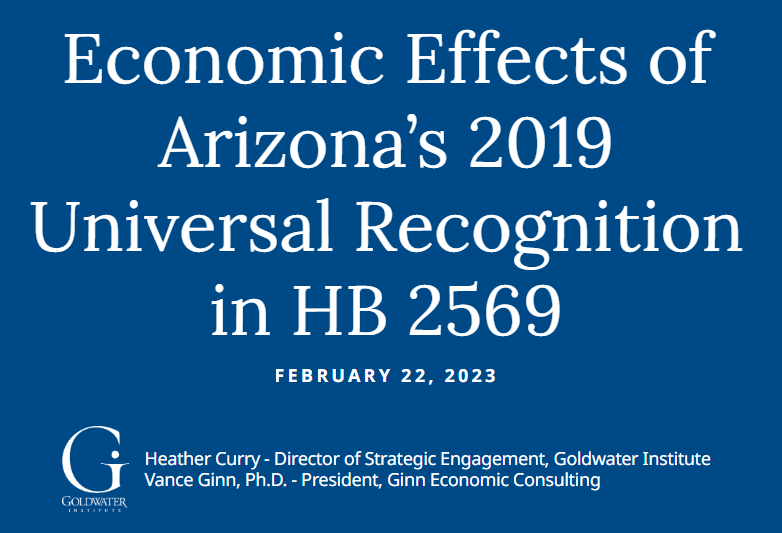
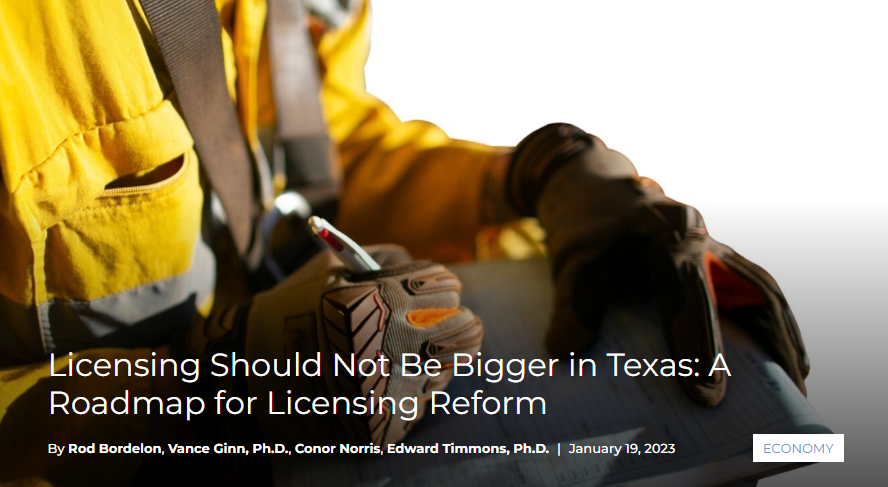
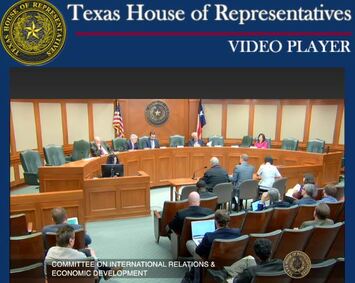
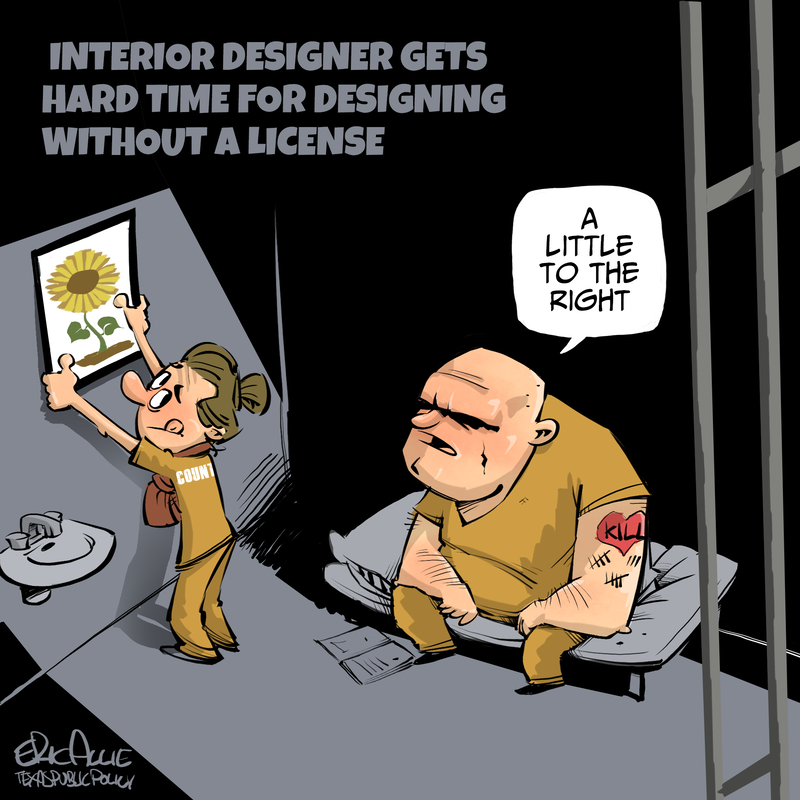
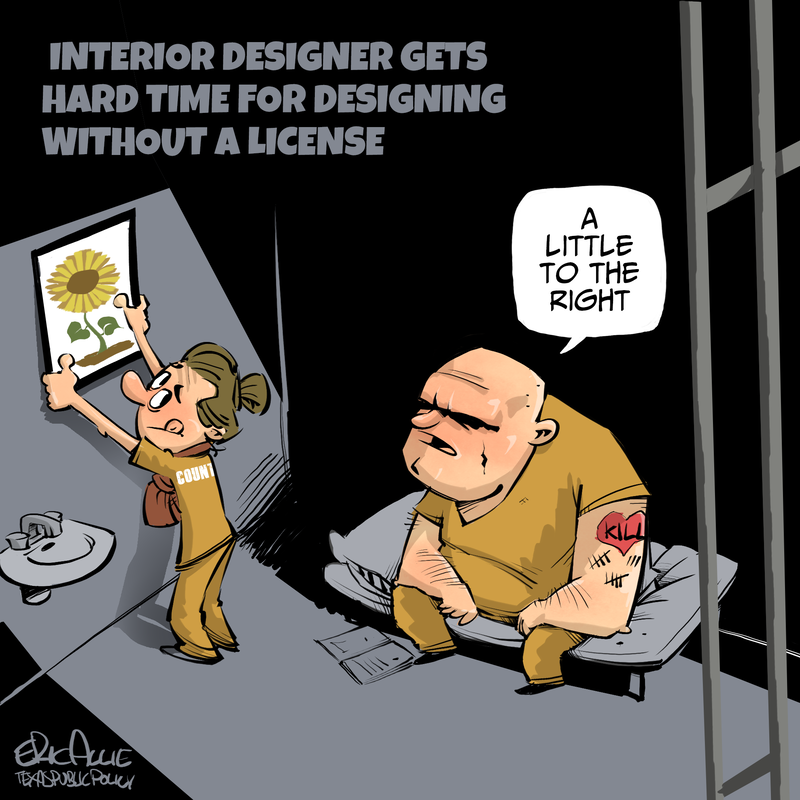

 RSS Feed
RSS Feed